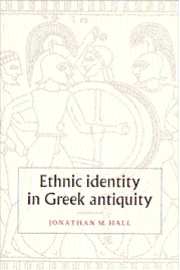Book contents
- Frontmatter
- Contents
- List of figures
- Preface and acknowledgements
- Abbreviations used in the text and bibliography
- 1 Phrasing the problem
- 2 The nature and expression of ethnicity: an anthropological view
- 3 The discursive dimension of ethnic identity
- 4 Ethnography and genealogy: an Argolic case-study
- 5 Ethnicity and archaeology
- 6 Ethnicity and linguistics
- 7 Conclusion
- Chronological table
- Chronological table of authors cited in the text
- Bibliography
- Index
Preface and acknowledgements
Published online by Cambridge University Press: 03 February 2010
- Frontmatter
- Contents
- List of figures
- Preface and acknowledgements
- Abbreviations used in the text and bibliography
- 1 Phrasing the problem
- 2 The nature and expression of ethnicity: an anthropological view
- 3 The discursive dimension of ethnic identity
- 4 Ethnography and genealogy: an Argolic case-study
- 5 Ethnicity and archaeology
- 6 Ethnicity and linguistics
- 7 Conclusion
- Chronological table
- Chronological table of authors cited in the text
- Bibliography
- Index
Summary
I hope it will not seem too perverse to establish, at the outset, what this book is not about. In the first place, its object of study is not a collective Hellenic identity, but rather the plurality of ‘intrahellenic’ identities, of which the Ionians, Dorians, Aiolians and Akhaians are simply the best-known examples. It might be argued that this distinction is simply one of degree and that what we have in Greek antiquity is a situation that is sometimes termed ‘nested ethnicity’, whereby a citizen of a city such as Sparta could subscribe not only to a Dorian ethnicity but also to a Greek identity that was itself constituted by ethnic subdivisions such as the Dorians and Aiolians. That is certainly one way of explaining why Greek myth regarded ethnic eponyms such as Doros and Aiolos as the sons of the Hellenic Urvater, Hellen, though I believe that there is a case to be made for keeping the two levels of identity distinct. Firstly, it is clear that some of these intrahellenic ethnic identities may have existed prior to the emergence of a fully blown Hellenic consciousness which sought to subsume them. Secondly, while the identity of groups such as the Dorians or the Ionians could undoubtedly become politicised, it generally tended to retain (with varying degrees of salience) its ethnic definition. Conversely, although Hellenic identity was clearly envisaged in the sixth century BC as being ethnic in character, there is some evidence that by the fourth century it was conceived more in cultural terms.
- Type
- Chapter
- Information
- Ethnic Identity in Greek Antiquity , pp. xiii - xvPublisher: Cambridge University PressPrint publication year: 1997
- 1
- Cited by



